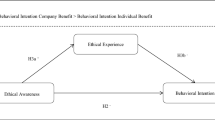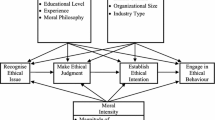Abstract
Recent business headlines, particularly those related to the collapsed energy-trading giant, Enron and its auditor, Arthur Andersen raise concerns about accountants' ethical reasoning. We propose, and provide evidence from 90 new auditors from Big-Five accounting firms, that a selection-socialization effect exists in the accounting profession that results in hiring accountants with disproportionately higher levels of the Sensing/Thinking (ST) cognitive style. This finding is important and relevant because we also find that the ST cognitive style is associated with relatively low levels of ethical reasoning, regardless of gender. This finding implies a need for emphasis on the ethical training of accountants. The results also suggest that accounting firms should consider recruiting accountants with cognitive styles associated with relatively higher levels of ethical reasoning.
Similar content being viewed by others
References
Abdolmohammadi, M. J., D. R. L. Gabhart and M. F. Reeves: 1997, ‘Ethical Cognition of Business Students Individually and in Groups’, Journal of Business Ethics 16, 1717–1725.
Armstrong, M. B.: 1987, ‘Moral Development and Accounting Education’, Journal of Accounting Education 5, 27–43.
Bernardi, R. A.: 1995, ‘Ethics Research in Accounting: A Note on Using the Defining Issues Test’, Accounting Educators' Journal 7(2), 1–16.
Bernardi, R. A. and D. F. Arnold: 1997, ‘An Examination of Moral Development Within Public Accounting by Gender, Staff Level, and Firm’, Contemporary Accounting Research 14(2) (Winter), 653–668.
04/b3767712.htm
Etherington, L. D. and L. Shulting: 1995, ‘Ethical Development of Accountants’, Research on Accounting Ethics 1, 235–251.
Fisher, D. G. and R. L. Ott: 1996, ‘A Study of the Relationship Between Accounting Students' Moral Reasoning and Cognitive Styles’, Research on Accounting Ethics 2, 51–71.
Ford, M. R. and C. R. Lowery: 1986, ‘Gender Differences in Moral Reasoning: A Comparison of the Use of Justice and Care Orientations’, Journal of Cognitive style and Social Psychology 50, 777–783.
Geary, W. T. and C. J. Rooney: 1993, ‘Designing Accounting Education to Achieve Balanced Intellectual Development’, Issues in Accounting Education (Spring), 60–70.
Gilligan, C.: 1982, In a Different Voice (The Harvard University Press, Cambridge, MA).
Habermas, J.: (1981) 1987, ‘Tendencies Towards Juridification; The Tasks of a Critical Theory of Society’, in The Theory of Communicative Action, Volume 2 (Beacon, Boston), pp. 356–403.
Icerman, R., J. Karcher and M. Kennelley: 1991, ‘A Baseline Assessment of Moral Development: Accounting, Other Business and on-business Students’, Accounting Educators' Journal (Winter), 46–62.
Jacoby, P. F.: 1981, ‘Cognitive Styles and Career Success in the Accounting Profession’, Research in Psychological Type 4, 24–37.
Jeffrey, C.: 1993, ‘Ethical Development of Accounting Students, Business Students, and Liberal Arts Students’, Issues in Accounting Education (Spring), 86–96.
Kohlberg, Lawrence: 1981, The Philosophy of Moral Development: Moral Stages and the Idea of Justice (Harper & Row, San Francisco).
Lampe, J. and D. Finn: 1992a, ‘A Model of Accountants' Ethical Decision Process’, Accounting A Journal of Practice and Theory (Supplement), 33–59.
Lampe, J. and D. Finn: 1992b, ‘Reply’, Accounting A Journal of Practice and Theory (Supplement), 73–78.
Lifton, P. D.: 1985, ‘Individual Differences in Moral Development: The Relation of Sex, Gender and Cognitive Style to Morality (Special issue: Conceptualizing Gender in Cognitive Style Theory and Research)’, Journal of Cognitive Style 53(2), 306–334.
Lyons, N. P.: 1983, ‘Two Perspectives: Oneself, Relationships, and Morality’, Harvard Educational Review 53 (May), 125–145.
Myers, I. B. and M. H. McCaulley: 1985, Manual: A Guide to the Development and Use of the Myers-Briggs Type Indicator (Consulting Psychologists Press, Palo Alto, CA).
Ponemon, L. A.: 1992, ‘Ethical Reasoning and Selection-socialization in Accounting, Accounting’, Organizations and Society 17(3–4), 239–258.
Ponemon, L. A. and D. R. L. Gabhart: 1993, ‘Ethical Reasoning in Accounting and Accounting’, in Research Monograph No. 21 (CGA-Canada Research Foundation, Vancouver, BC).
Ponemon, L. A. and A. Glazer: 1990, ‘Accounting Education and Ethical Development: The Influence of Liberal Learning on Students and Alumni in Accounting Practice’, Issues in Accounting Education 5(2) (Fall), 195–208.
Rest, J. R.: 1979. Development in Judgment Moral Issues (University of Minnesota Press, Minneapolis, MN).
Rest, J. R.: 1986, Moral Development: Advances in Research and Theory (Praeger Publishers, Inc., New York).
Rest, J. R.: 1994, ‘Background: Theory and Research’, in J. R. Rest and D. Narvaez (eds.), Moral Development in the Professions (Erlbaum, Hillsdale, NJ), pp. 1–26.
Scarbrough, D. P.: 1993, ‘Cognitive Styles and Job Satisfaction of Accountants’, Journal of Psycological Type 25, 3–10.
Schloemer, P. G. and M. S. Schloemer: 1997, ‘The Personality Types and Preferences of CPA Firm Professionals: An Analysis of Changes in the Profession’, Accounting Horizons 11(4), 24–39.
Shaub, M. K.: 1994, ‘An Analysis of the Association of Traditional Demographic Variables with Moral Reasoning of Accounting Students and Accountants’, Journal of Accounting Education 12(1), 1–26.
Sweeney, J.: 1995, ‘The Moral Expertise of Accountants: An Exploratory Analysis’, Research on Accounting Ethics 1, 213–234.
Thoma, S. J.: 1986, ‘Estimating Gender Differences in the Comprehension and Preference of Moral Issues’, Developmental Review 6, 165–180.
Vaassen, E. H. J., C. R. Baker and R. S. Hayes: 1993, ‘Cognitive styles of Experienced Accountants in the Netherlands’, British Accounting Review 25, 367–382.
Wheeler, P:. 2001, ‘The Myers-Briggs Type Indicator and Applications to Accounting Education and Research’, Issues in Accounting Education 16(1), 125–150.
Author information
Authors and Affiliations
Rights and permissions
About this article
Cite this article
Abdolmohammadi, M.J., Read, W.J. & Scarbrough, D.P. Does Selection-Socialization Help to Explain Accountants' Weak Ethical Reasoning?. Journal of Business Ethics 42, 71–81 (2003). https://doi.org/10.1023/A:1021691001119
Issue Date:
DOI: https://doi.org/10.1023/A:1021691001119




